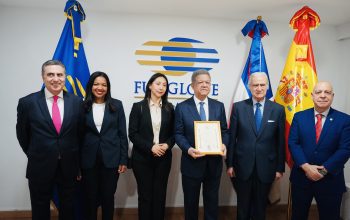news
New Fellow Christina Davidson Explores the History of Protestantism in the Dominican Republic
December 17, 2014
The Fellows Program, an initiative of GFDD and FUNGLODE, is excited to introduce its newest scholar Christina Davidson, doctoral candidate in history at Duke University. Christina’s body of research focuses on Latin America and the Caribbean with a specialty in Dominican History. Her dissertation, entitled,
“Converting Spanish Hispaniola: Transnational Genealogies and Racial Politics of Protestantism in the Dominican Republic,” explores the intersection of national, racial, and religious imaginaries and how ideas about race, religion, and the nation change across time and within the transnational, circum-Caribbean world. Her research is being conducted in the United States, Puerto Rico and the Dominican Republic. The Dominican Republic portion of her
field work will be conducted in conjunction with the Fellows Program over ten months, from November 2014 – August 2015, with a focus on collecting data from the National Archive and the Archive of the Dominican Evangelical Church. In these two archives, she will look for documents regarding Protestant activity during the early twentieth century.
About Christina
 A native of Skokie, Illinois, Christina graduated from Yale University with a dual degree in Latin American Studies and International Studies in 2009. During her undergraduate education, she took classes in Spanish language and literature, Latin American history and culture, and race theory. She also conducted research as a Mellon Mays Undergraduate
A native of Skokie, Illinois, Christina graduated from Yale University with a dual degree in Latin American Studies and International Studies in 2009. During her undergraduate education, she took classes in Spanish language and literature, Latin American history and culture, and race theory. She also conducted research as a Mellon Mays Undergraduate
Fellow (2007-2009). This fellowship supported her first research experience at the United Nations Institution for the Research and Advancement of Women (INSTRAW) in the Dominican Republic in 2007. During that year, she also partnered with InteRDom and studied abroad
with CIEE-Santo Domingo.
In 2010, she matriculated at Duke University as a graduate student in the History department. From 2010-2013, she took graduate classes in Latin American,
Afro-Brazilian, Haitian, and Atlantic history. Her courses in research methods and theory were in the fields of History (at Duke) and Communication Studies (at UNC). During her first three years of graduate school, she also studied French and Portuguese at Duke and abroad in Canada and Brazil. In May of 2013, she graduated with an M.A. in History from Duke, and earned Ph.D. candidate status in December of 2013.
As a scholar, she is interested in race and religion
in the circum-Caribbean. Religion has always operated as a crucial component in the making of race and the separation between the “civilized” and “barbarian.” She is interested in the ways that people imagined religion and race in the 19th and 20th centuries, and the ways that such imaginaries affected ideas about nationhood. She also explores evolving notions of race in the present.
Over the summer of 2014, she
received two grants from the General Commission of Archives and History of the United Methodist Church to complete research in the US northeast and Puerto Rico. In November 2014, she begins full-time research in the Dominican Republic as a
Duke Fulbright-Hays Fellow and as part of the GFDD/FUNGLODE Fellows Program.
About the Research
Christina’s dissertation focuses on the history of Protestantism in the Dominican Republic and examines the
establishment of Protestant Christianity. The development of Dominican Protestantism in the nineteenth century—and the explosive recent growth of Pentecostalism (1980s to present)—challenge the traditional Spanish-Catholic national imaginary of the country. Who were the people involved in spreading Protestantism in traditionally Catholic Dominican Republic? And, in what ways did their beliefs about God, race, and the role of the nation drive their actions and ultimately
transform the nation?
Her dissertation analyzes how Dominican Protestants have—over 170 years—navigated the country’s spiritual, cultural, and political terrain. Given its Haitian, black and white North-American, African and Puerto Rican roots, Dominican Protestantism provides a useful point of entry for understanding shifting Dominican views about race, color, and African descent within a broader transnational terrain. This dissertation
thus captures Protestantism’s impacts on Dominican racial, cultural, and national life.
Some of the questions she asks in her research are: How did ideas about race influence Protestant evangelization in the Caribbean and Latin America? And, how did the growth of Protestantism in the Spanish Caribbean reciprocally affect how people thought about race and the nation?
Her dissertation calls for both archival and ethnographic
research.
Christina will realize her fellowship under her advisors and dissertation committee members: Dr. Laurent Dubois (dissertation chair), Dr. John French, Dr. Adrianne Lentz-Smith, and Dr. Michaeline Crichlow. In the Dominican Republic, she will be advised by members of the Academia Dominicana de la Historia.
About the Fellows Program
The Fellows Program was developed in 2009 to respond to
the desire of GFDD and FUNGLODE to develop a community of scholars that contributes to the Foundations’ growing body of research on matters of international concern that directly impact the Dominican Republic, complementing the overall mission of GFDD and FUNGLODE to promote academic exchange, generate scholarship, and influence the creation of public policy related to economic and social development both at the national and international level.
Through
The Fellows Program, GFDD and FUNGLODE seek to generate scholarship on issues at the forefront of the United Nations’ agenda in order to give voice to national and regional concerns and offer viable solutions to domestic and international challenges.
The Fellows Program provides opportunities for M.S., M.A. and Ph.D. candidates interested in conducting high-level research in the Dominican Republic on issues related to sustainable development. The final output of
the investigation is a comprehensive report which includes empirical data. Fellows realize research in coordination with GFDD and FUNGLODE staff, National Advisor and their university professors. Fellows that carry-out exemplary work have the opportunity to present their findings before the United Nations community on behalf of GFDD and FUNGLODE.






